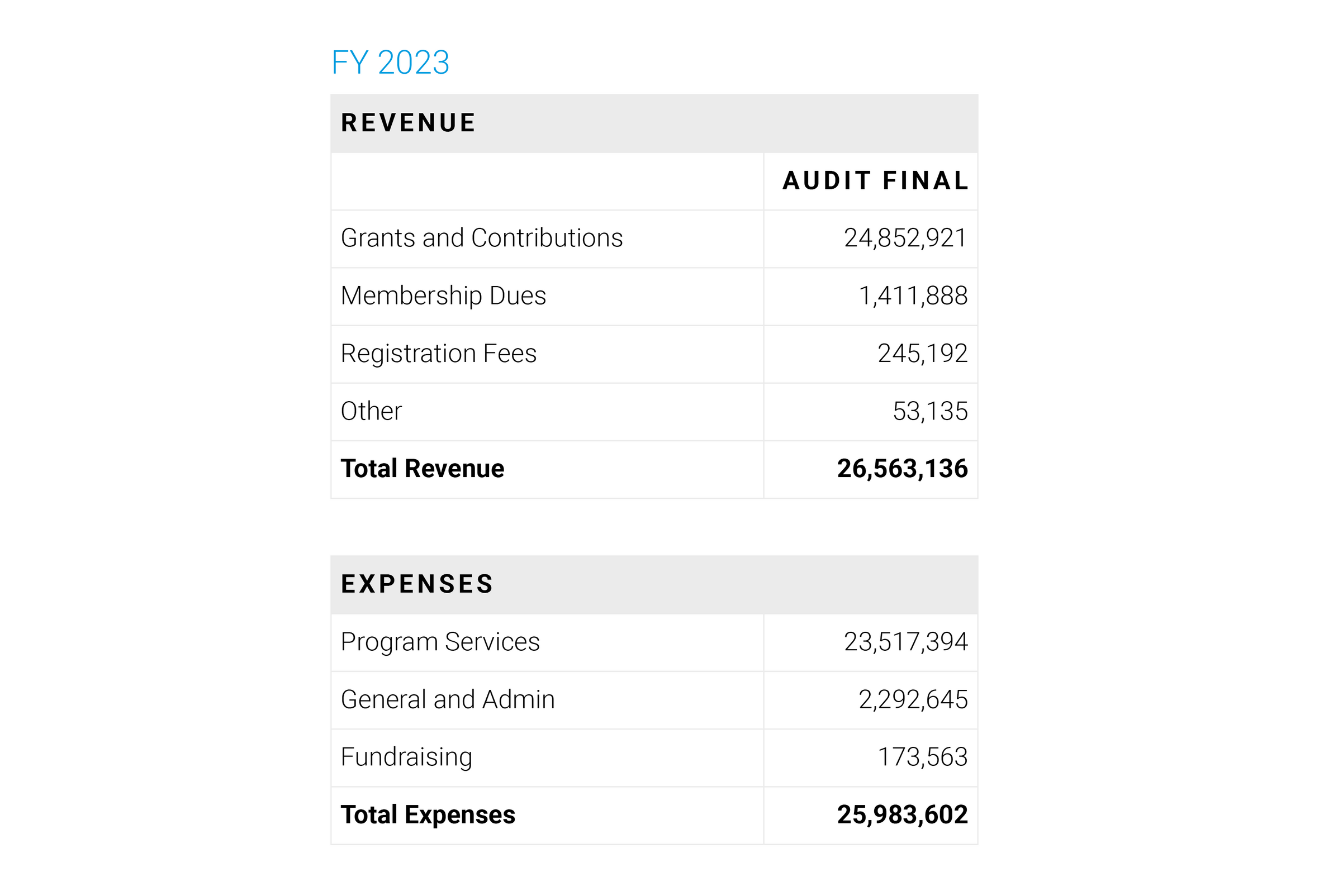
2023 Annual Report
Introduction

2023 was a successful year for NASTAD and the people we serve. Throughout the year, we published dozens of factsheets, toolkits, microsites, and other resources on topics like legal research on the authority of pharmacists, trauma-informed approaches, harm reduction and housing, ADAPs, and much more. NASTAD’s staff also hosted more than 30 webinars throughout 2023 – most of which were recorded and archived on our website.
For the first time since 2019, we found ourselves transitioning fully back to in-person gatherings at our Annual Meeting, HIV & Hepatitis Technical Assistance Meeting, and various other events throughout the year. In-person again this year was NASTAD’s Minority Leadership Program (MLP), now in its ninth cycle. This year’s cohort had 14 fellows that participated in a transformative space where life-long connections were made, and visions for equitable health were solidified.
Our membership energetically embraced our Chair’s Challenge, Access, Engage, & Activate: Centering and Recentering Key Populations. Dave Kern, NASTAD’s Board Chair, has called on the membership to center and recenter four key populations in our efforts to end the HIV and hepatitis epidemics: persons of trans experience; persons who use drugs; persons aging with HIV; and gay, bisexual, and other same gender loving men.
I feel an immense sense of pride and excitement looking back on the hard work and accomplishments of the NASTAD staff, our members, and our partners in 2023. Our efforts helped us to advance the health and dignity of people living with and impacted by HIV/AIDS, viral hepatitis, and intersecting epidemics, and while there is still so much more to do, I am confident we can build on our momentum and continue making an impact in 2024 and beyond.
Dr. Stephen Lee, Executive Director
Groundbreaking Resources
Throughout 2023, NASTAD developed several groundbreaking resources to help health departments advance the health and dignity of people living with and vulnerable to HIV/AIDS and hepatitis. Browse through these reports, fact sheets, and toolkits below.
Resources
Applicable Trainings
NASTAD staff hosted a series of meetings across the nation that provided health department staff with technical assistance, professional development, and networking opportunities. Use the map below to learn more about some of these innovative trainings.
Map
Meeting Locations
Alaska
No Info
Alabama
Arkansas
Arizona
California
Colorado
Connecticut
District of Columbia
Meeting Held
Spring NASTAD Board of Directors Meeting
In March, NASTAD’s Board of Directors met in Washington, DC for an in-person board meeting. The Board discussed the Opioid Settlement funding, the National ADAP Monitoring report, and key policy updates. The Board received training from Health Justice, who led an anti-Racism session focused on advancing our commitment to address health equity and anti-racism in public health. The Board was also joined by federal partners from CDC DHP and HRSA.
2023 NASTAD Annual Meeting
NASTAD held its 2023 Annual Meeting in Washington, DC in May 2023. The meeting featured outstanding plenary, affinity, and breakout sessions, networking opportunities, and a first-time chance for many of our expanded membership and growing staff to have a seat at NASTAD’s table. In his inspiring closing plenary, NASTAD Chair, David Kern (Chicago), presented his 2023-2024 Chair’s Challenge, “Access, Engage, & Activate: Recentering Key Populations.”
During the meeting, NASTAD elected and announced the 2023-2024 Board of Directors and celebrated the accomplishments of dedicated members, staff, and partners. This year, NASTAD was pleased to recognize the contributions of the following health department staff and partners:
- 2023 Lifetime Achievement Award: Randy Mayer (Iowa)
- 2023 Lifetime Achievement Award: Kevin Cranston (Massachusetts)
- 2023 Service Award: Beth Crutsinger-Perry (Washington)
- 2023 Partnership Award: Jen Hecht (Building Healthy Online Communities)
- 2023 Chair’s Challenge Award: Arlis Jenkins (Arizona)
- Nicholas A. Rango Award: NASTAD’s ARPH Co-Chairs Ricardo Fernández (Arizona), Larry Stribling (Indiana), Sharisse Kemp (California)
2023 National HIV and Hepatitis Technical Assistance Meeting
NASTAD hosted the 2023 National HIV and Hepatitis Technical Assistance Meeting in October 2023. This year’s theme was “Reaffirming Meaningful Community Engagement,” which included focused discussion on engaging communities that are crucial to ending intersecting syndemics – specifically gay/bisexual men and other men who have sex with men; people of transgender experience; people who are aging with HIV; and people who use drugs. More than 300 attendees gathered during the three-day event to participate in various conversations about HIV and hepatitis policy, clinical developments, and innovative programming. This was NASTAD’s first entirely in-person Mega Meeting since 2019.
Fall NASTAD Board of Directors Meeting
NASTAD’s Board gathered for the Fall Board of Directors meeting in November. This was a joint NASTAD-NCSD Board of Directors meeting, which allowed the two organizations to discuss shared issues amongst their membership. The two Boards also engaged with federal partners from HHS, the White House, CDC NCHHSTP, DSTDP, and DVH.
Delaware
Florida
Georgia
Hawaii
Iowa
Idaho
Illinois
Indiana
Kansas
Kentucky
Louisiana
Massachusetts
Maryland
Maine
Michigan
Minnesota
Missouri
Mississippi
Montana
North Carolina
North Dakota
Nebraska
New Hampshire
New Jersey
New Mexico
Nevada
New York
Ohio
Oklahoma
Oregon
Pennsylvania
Rhode Island
South Carolina
South Dakota
Tennessee
Texas
Utah
Virginia
Vermont
Washington
Wisconsin
West Virginia
Wyoming
Guam
Northern Mariana Islands
American Samoa
Puerto Rico
Marshall Islands
Palau
Federated States of Micronesia
Virgin Islands
Chicago
Meeting Held
Partner Services Learning Collaborative (Year 2)
NASTAD, in partnership with consultants from the University of Washington and NCSD, launched cohort two of the Partner Services Learning Collaborative. The learning collaborative is a virtual peer learning group for select Phase 1 EHE Jurisdictions interested in modernizing their HIV/STI field services. The second cohort takes place over a 12-month period between September 2023 and September 2024, and started with an in-person kickoff meeting in September 2023. The learning collaborative addresses the following: integrating linkage to PrEP into HIV/STI partner services, improving the HIV case-finding effectiveness of partner services, integrating linkage and relinkage to care in partner services (i.e., data to care), field services data management and use of newer technologies, prioritization of field services work, and implementation of cluster detection and response. NASTAD selected eight jurisdictions to participate in the second cohort of the Partner Services Learning Collaborative.
Tuscon
2023 Minority Leadership Program
Over nine cycles, the Minority Leadership Program (MLP) has engaged more than 130 people of color in a transformative space where life-long connections are built and visions for equitable health are solidified. The MLP curriculum includes sessions that allow participants to develop their ability to impart organizational change, communicate ideas, strengthen soft skills, and understand workplace and interpersonal dynamics. The 2023 cohort consisted of health department leaders from Colorado, Florida, Indiana, Iowa, Massachusetts, Missouri, New York, North Dakota, Oregon, Pennsylvania, Texas, and Washington State, along with members of NASTAD’s Health Equity team.
Charlotte
Trauma Informed Approaches to the Status Neutral Continuum Workshop
The NASTAD workshop, “Trauma Informed Approaches to the Status Neutral Continuum,” was held through our Capacity Building Assistance (CBA) program in Charlotte, NC from November 7-9, 2023. The goal of this meeting was to equip southern Health Department and Community Based Organizations with the knowledge, skills, and abilities to increase status neutral implementation of trauma informed approaches in the South. By the end of the workshop, more than 15 participants from HD HIV prevention and care program staff and CBO staff based in southern jurisdictions were provided with the knowledge and insights to be able to understand how trauma and healing impacts individuals engaged in status neutral services; identify opportunities for incorporating trauma informed approaches and healing-centered engagement along status neutral pathways; develop action plans for TIA implementation in participants respective programs; and implement trauma informed activities in their programs.
Fort Lauderdale
NASTAD’s 2023 Southern CBO Summit
The Southern CBO Summit (SCS) is a learning collaborative comprised of HIV prevention workforce leaders who are working at community-based organizations (CBO) in the southern United States. The 2022 SCS was held in-person in Fort Lauderdale, Florida, from January 9-11, 2023. This summit brought together more than 50 community leaders for a multi-day event to focus on leadership development. The goal of the summit was to share best practices, refine leadership approaches, and promote innovative solutions for the implementation of high-impact HIV prevention strategies. After attending this summit, participants were able to identify key leadership approaches for HIV prevention staff in Southern Community-Based Organizations by leveraging peer-to-peer expertise from across the entire region; leverage principles of health equity, storytelling, policy, and stigma reduction to grow community impact and develop programmatic priorities; and build on existing opportunities for growth, navigate gaps in success, and scale-up strategies for more effective delivery of HIV prevention services in the South.
Phoenix
2023 Ending the HIV Epidemic (EHE) Implementation Regional Technical Assistance (TA) Convenings
In 2023, NASTAD conducted four (4) two-day Ending the HIV Epidemic (EHE) Implementation Regional Technical Assistance (TA) Convenings in each of the four EHE Phase 1 Jurisdictions funded through CDC PS20-2010 Component A. The purpose of the convenings was to fortify implementation of the goals across the four national pillars (Diagnose, Prevent, Treat, Respond) and within individual plans. These meetings aimed to continue the advancement and alignment of EHE efforts with CDC’s Division of HIV Prevention (DHP) while also tailoring to the specific needs of each region.
Topics centered around each of the four EHE pillars with a focus on strengthening syndemic collaborations, PrEP access and uptake, advancing status-neutral approaches, community engagement, and workforce development. As a technical assistance meeting, health departments and community leaders learned from peers and national TA providers, as well as strengthen EHE plans and activities.
The four convenings were held in:
-
Phoenix, AZ
-
Philadelphia, PA
-
Columbus, OH
-
Birmingham, AL
Philadelphia
2023 Ending the HIV Epidemic (EHE) Implementation Regional Technical Assistance (TA) Convenings
In 2023, NASTAD conducted four (4) two-day Ending the HIV Epidemic (EHE) Implementation Regional Technical Assistance (TA) Convenings in each of the four EHE Phase 1 Jurisdictions funded through CDC PS20-2010 Component A. The purpose of the convenings was to fortify implementation of the goals across the four national pillars (Diagnose, Prevent, Treat, Respond) and within individual plans. These meetings aimed to continue the advancement and alignment of EHE efforts with CDC’s Division of HIV Prevention (DHP) while also tailoring to the specific needs of each region.
Topics centered around each of the four EHE pillars with a focus on strengthening syndemic collaborations, PrEP access and uptake, advancing status-neutral approaches, community engagement, and workforce development. As a technical assistance meeting, health departments and community leaders learned from peers and national TA providers, as well as strengthen EHE plans and activities.
The four convenings were held in:
-
Phoenix, AZ
-
Philadelphia, PA
-
Columbus, OH
-
Birmingham, AL
Columbus
2023 Ending the HIV Epidemic (EHE) Implementation Regional Technical Assistance (TA) Convenings
In 2023, NASTAD conducted four (4) two-day Ending the HIV Epidemic (EHE) Implementation Regional Technical Assistance (TA) Convenings in each of the four EHE Phase 1 Jurisdictions funded through CDC PS20-2010 Component A. The purpose of the convenings was to fortify implementation of the goals across the four national pillars (Diagnose, Prevent, Treat, Respond) and within individual plans. These meetings aimed to continue the advancement and alignment of EHE efforts with CDC’s Division of HIV Prevention (DHP) while also tailoring to the specific needs of each region.
Topics centered around each of the four EHE pillars with a focus on strengthening syndemic collaborations, PrEP access and uptake, advancing status-neutral approaches, community engagement, and workforce development. As a technical assistance meeting, health departments and community leaders learned from peers and national TA providers, as well as strengthen EHE plans and activities.
The four convenings were held in:
-
Phoenix, AZ
-
Philadelphia, PA
-
Columbus, OH
-
Birmingham, AL
Birmingham
2023 Ending the HIV Epidemic (EHE) Implementation Regional Technical Assistance (TA) Convenings
In 2023, NASTAD conducted four (4) two-day Ending the HIV Epidemic (EHE) Implementation Regional Technical Assistance (TA) Convenings in each of the four EHE Phase 1 Jurisdictions funded through CDC PS20-2010 Component A. The purpose of the convenings was to fortify implementation of the goals across the four national pillars (Diagnose, Prevent, Treat, Respond) and within individual plans. These meetings aimed to continue the advancement and alignment of EHE efforts with CDC’s Division of HIV Prevention (DHP) while also tailoring to the specific needs of each region.
Topics centered around each of the four EHE pillars with a focus on strengthening syndemic collaborations, PrEP access and uptake, advancing status-neutral approaches, community engagement, and workforce development. As a technical assistance meeting, health departments and community leaders learned from peers and national TA providers, as well as strengthen EHE plans and activities.
The four convenings were held in:
-
Phoenix, AZ
-
Philadelphia, PA
-
Columbus, OH
-
Birmingham, AL
Innovative Initiatives
In 2023, NASTAD implemented several projects that utilized innovative approaches towards at-home testing, harm reduction, PrEP/PEP access, and more.
Together Take Me Home

Together Take Me Home (TTMH) — an expansion of a 2021 demonstration project, officially launched in March 2023. Together TakeMeHome (TTMH), is a national direct-to-consumer program that offers free HIV self-tests through mail delivery. Through TTMH, people in the United States, including Puerto Rico, can order up to two free HIV self-tests every 90 days. Tests are available to anyone 17 years or older, regardless of health insurance or immigration status.
Within the first week, over 43,000 kits were ordered and by six months, TTMH mailed out over 250,000 kits. In September 2023, given the extremely successful launch of Together TakeMeHome (TTMH), the CDC awarded additional funding to Emory to distribute an additional 150,000 free HIV self-tests , for a total of up to 350,000 tests in year one of the program.
TTMH is supported by CDC, in partnership with Emory University, Building Healthy Online Communities (BHOC), NASTAD, Signal Group, and OraSure Technologies.
Harm Reduction

NASTAD launched several harm reductions resources and trainings throughout 2023.
National Harm Reduction Technical Assistance Training Materials on Sex Worker Health and Harm Reduction 101
This learning tool was designed to provide an overview of the basics of sex worker health and harm reduction philosophy. The tool consists of the PowerPoint Slide Deck, Facilitator Guide, Training Handout, and a Sample Engagement Page. These materials are customizable for in-house staff training purposes. This project was designed for use by health departments and community-based syringe services programs (SSPs) to introduce participants to sex work, sex worker health, and the intersection of harm reduction. Upon completing the training, participants were able to define sex work and harm reduction, define who participates in the sex trade, identify barriers to care for people who trade sex, and understand strategies to address anti-sex worker stigma in organizational practices.
Wound Care & Medical Triage for People Who Use Drugs and the Programs That Serve Them
Wound Care & Medical Triage for People Who Use Drugs and the Programs That Serve Them is a comprehensive guide that is designed to provide information and recommendations regarding general health, safer use practices, common viral, fungal, parasitic, and other injection-related infections, overdose and overamp, tapering, withdrawal, medications for opioid use disorder, and seeking medical care. This guide is intended to be used by people who use drugs and the community-based organizations, grassroots programs, health departments, and other harm reduction service providers that work with people who use drugs.
Harm Reduction and Housing Video Series
Released in June 2023, the Harm Reduction and Housing Video Series and accompanying infographic, Applying Harm Reduction in Housing Settings, explores the complexities related to harm reduction within supportive housing and temporary shelter programs. With a total of 13 videos and over 1,600 views on YouTube, this video series summarizes the evidence supporting these frameworks, highlights a variety of successful models, and underscores important implementation tips. Video topics include, “Preventing Overdose Fatalities in Permanent Supportive Housing,” “Housing and Harm Reduction for Alcohol Use,” “Harm Reduction in Housing for People with Severe Mental Illness,” “Harm Reduction in Temporary Shelter Settings,” and “Tips for Doing This at Your Own Site.”
This resource is intended to be used by health departments, harm reduction programs, housing providers, temporary shelter providers, and other community-based organizations that are interested in providing housing services or partnering with housing programs in their community.
Thinking About Starting a Supportive Housing Program? Recommendations and Considerations for the Planning Process
Informed by conversations with current housing and harm reduction service providers, Thinking About Starting a Supportive Housing Program? Recommendations and Considerations for the Planning Process was developed to help inform programmatic development for supportive housing. It is intended for governmental and community-based organizations interested in developing housing programs within their organization or collaborating with other partners in their communities.
Stimulant Safety: Getting Amped Up to Reduce Harms When Using Stimulants
Released in July 2023, Stimulant Safety: Getting Amped Up to Reduce Harms When Using Stimulants aims to educate individuals and organizations that provide services to people who use methamphetamine and other stimulants to help reduce stigma, minimize harm, and improve services for people who use drugs. Information is provided on the potential benefits and risks of stimulant use, the intersection of stimulant use and sexual safety, tips for accessing supplies and materials to include in safer use kits, and how to recognize and respond to overamping.
Outlining Pharmacists’ Authority to Provide PrEP/PEP and Harm Reduction Services

In August 2023, NASTAD finalized a research project assessing the legal authority for pharmacists to provide harm reduction services, initiate PrEP and PEP, and engage in collaborative practice agreements (CPAs). For this project NASTAD developed several resources that emphasize the vital role community pharmacies play in empowering people who use drugs (PWUD) and preventing HIV transmissions, including:
- A database that includes an assessment of the legal authority for pharmacists to provide PrEP, PEP, and harm reduction services, and engage in CPAs in all 50 U.S. states, the District of Columbia, Puerto Rico, and the U.S. Virgin Islands.
- Two interactive maps (found hereand here) that include an assessment of the legal authority for pharmacists to provide PrEP and PEP and pharmacists’ authority to engage in CPAs, including an assessment of the legal authority for pharmacists to dispense naloxone and sell non-prescription syringes.
- Two issue briefs (found here and here) that expand upon the issues that impact pharmacists’ ability to provide PrEP, PEP, and harm reduction services and engage in CPAs. The issue briefs describe these barriers and recommend best practices for addressing them, when available.
Overall, this project aimed to illustrate community pharmacies as a vital harm reduction resource that can significantly contribute to public health efforts in harm reduction and HIV prevention.
Policy and Advocacy
NASTAD's Policy & Legislative Affairs team engaged in a variety of activities in 2023 to advance NASTAD’s legislative and policy priorities on federal appropriations and legislation related to HIV and hepatitis prevention, care, and treatment issues.
HIV Criminalization Consultation
In April 2023, NASTAD hosted a consultation, HIV Criminalization, Data Privacy, and the Role of Health Departments. The purpose of the consultation was to provide peer-to-peer information sharing on how health departments have engaged in HIV criminalization modernization reforms in their jurisdictions, identify examples of problematic laws, policies or practices that jeopardize the privacy of sensitive public and individual health data and potential solutions, identify engagement opportunities with law enforcement partners, including prosecutors, for developing best practices for response to public health issues, and identify opportunities to safeguard public health data.
Engagement with Congressional Offices
2023 was the first year since the onset of the COVID-19 pandemic that NASTAD conducted in-person Congressional Hill visits with NASTAD members. These visits, held during the 2023 NASTAD Annual Meeting, supported NASTAD’s efforts to advocate for policies and funding to support jurisdictional health departments in their efforts to end the HIV/AIDS, hepatitis, and intersecting epidemics. Overall, NASTAD staff conducted over 100 hill visits in 2023, both in person and virtually.
GWU HIV Summit
For the 10th year, NASTAD partnered with the George Washington University (GWU) Medical School to train their first-year students on HIV. The summit, How Clinicians Can Help End the HIV Epidemic: Prescriptions for State and City Action Plans, teaches first year GWU medical students how to extend their knowledge of HIV science and clinical care to the role clinicians need to play to improve community-level HIV health. The students’ study the federal Ending the HIV Epidemic Initiative (EHE) and apply that knowledge to selected jurisdictions, become educated about that jurisdiction’s HIV issues (epidemiology, trends, programs, health care system, and gaps), and to develop innovative proposals to enhance that jurisdiction’s HIV action plan.
Advocating for a National PrEP Program and Hepatitis C Elimination Funding
NASTAD’s Policy & Legislative Affairs (PLA) team continued their efforts to build support for a national PrEP program and a national hepatitis C (HCV) elimination effort. NASTAD engaged with the HIV and hepatitis communities and with the Administration and congressional offices on these two proposals and ensured that health departments were seen as a vital part to both plans. These proposed programs and funding will create new opportunities that are crucial in expanding and increasing access to PrEP and HCV curative treatments and helping achieve our mission of advancing the health and dignity of people living with and impacted by HIV/AIDS, viral hepatitis, and intersecting epidemics.
Finances
NASTAD's 2023 financial information can be found in the table below.
